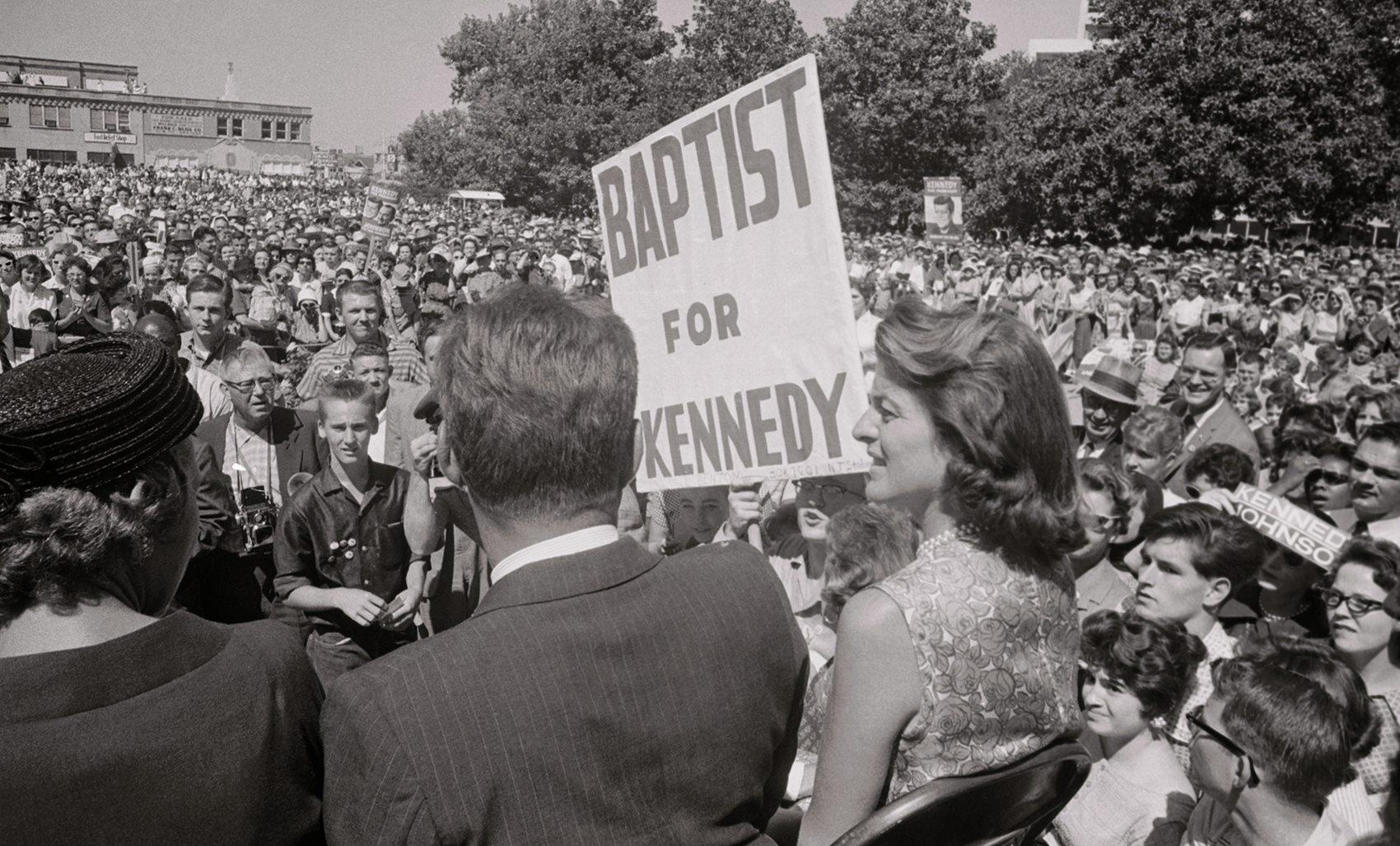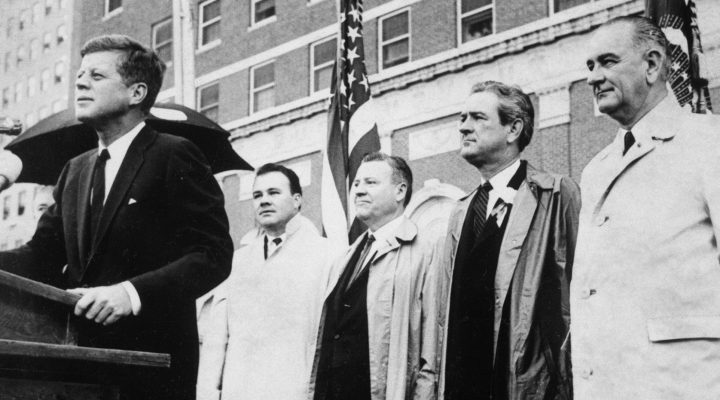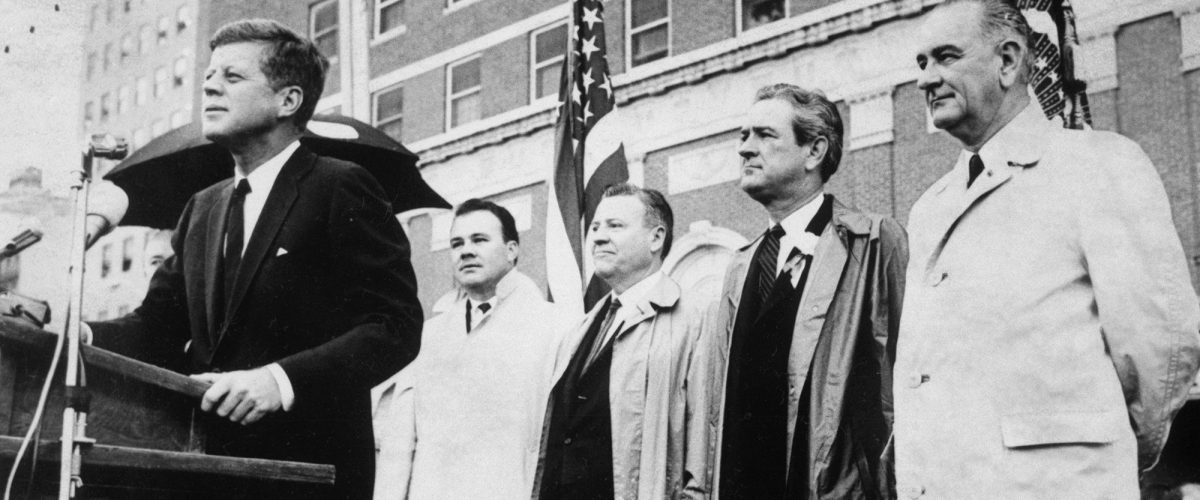John Fitzgerald Kennedy, 35th president of the United States, spent the last night of his life in the iconic Texas Hotel in Fort Worth. On the morning of Nov. 22, 1963, he attended a Chamber of Commerce breakfast, then mounted a flatbed truck in front of the hotel and gave a 3.3-minute address to a crowd of some 8,000 largely adoring Texans. After that, Kennedy and his spouse, Jacqueline, went to Dallas.
The rest, as they say, is history.

Bill Leonard
Sixty years ago, at 12:30 p.m. (CST), as the president’s open-car motorcade moved through Dealey Plaza in downtown Dallas, Kennedy was assassinated while waving to the crowds gathered along the route. Texas Gov. John Connally, riding with the Kennedys, was wounded but recovered. Kennedy was pronounced dead at Parkland Hospital, after two Catholic priests administered the last rites.
The Very Reverend Oscar L. Huber offered a Latin “conditional absolution,” declared when the priest is not certain that “the soul has departed the body”:
I absolve you from all censures and sins in the name of the Father, and of the Son and of the Holy Spirit. Amen. If you are living, may the Lord by this holy anointing forgive whatever you have sinned. Amen. I, by the faculty given to me by the Apostolic See, grant to you a plenary indulgence and remission of all sins and I bless you. In the name of the Father and of the Son and of the Holy Spirit. Amen.
Few if any of us who were alive on that Nov. 22 will ever forget the national grief that descended on the USA on that fateful day, especially those of us who lived in Fort Worth and Dallas. My own memories are, I hope, illustrative.
My father, a devoted “Roosevelt Democrat,” was in the Fort Worth crowd of 8,000 people who greeted “Jack” Kennedy outside the Texas Hotel Nov. 22. Dad urged me to accompany him downtown that day, but I resisted. Why? Because I was stupid, with little or no sense of history, a fact I’ve tried to correct over the years.
In the fall of 1963, I was a senior at Fort Worth’s R.L. Paschal High School. The chilling news of Kennedy’s death came to Paschal students as an announcement through the school’s public address system. “Stunned” is an inadequate understatement. Students and teachers alike were weeping and distraught.
“In the fall of 1963, I was a senior at Fort Worth’s R.L. Paschal High School.”
I was in the English class of Sue Coffman, one of the most formative teachers in my entire educational experience. She was young, demanding, direct and engaging. In short, she taught us how to write the English language, or at least tried to. Most of us had studied with her as juniors and readily signed on for a second year.
I do not remember how it transpired, but somehow in the midst of the sorrow, we decided we had to do something. “Miss Coffman,” later Dr. Coffman, suggested we plan a brief group presentation for the entire school in order to share our collective grief. Somehow she got permission from the principal’s office, and we went to the school auditorium, where the readings from literature, Scripture — both testaments — and prayers, were broadcast over the PA system. Nor can I recall the specific content of the program, but if memory serves, we sang “America the Beautiful.” We were too shocked to think of writing or recording what we said and did. We were simply attempting to find a communal means of sharing our profound sorrow.
Sue Coffman taught, challenged, nurtured and yes, pastored us as profoundly that day as at any time in our Paschal education. Sue now lives in Dallas where she is a longtime member of Wilshire Baptist Church. We’ve continued to stay connected over the years. On a terrible day of horrendous evil and national trauma, our teacher encouraged an attempt to bring a modicum of light into our collective darkness. It is a lesson I’ve never forgotten.
Recalling all that 60 years later, I believe 2023 is an important, even necessary, year for revisiting 1963. That America was, like this America, a land filled with violence. Consider 1963:
- President Kennedy assassinated.
- Medgar Evers assassinated.
- Four little girls assassinated by KKK members during Sunday school at Birmingham’s Sixteenth Street Baptist Church.
- Dogs and fire hoses were turned on peaceful civil rights demonstrators, also in Birmingham.
- President Kennedy sent the National Guard into Birmingham in response to the violence.
- Yet amid that social chaos came the 1963 March on Washington highlighted by Martin Luther King Jr’s “I Have a Dream” speech, words that then and now offer light amid enduring darkness. (King and Robert Kennedy would die at the hands of assassins 5 years later.)
Truth to tell, John F. Kennedy was suspect by many from the time he entered the presidential race, none more controversial than the fact that he was young and Roman Catholic.

On Sept. 13, 1960, with “Baptist For Kennedy” sign being held up, Sen. John F. Kennedy and his sister, Mrs. Peter Lawford, view the crowd gathered to hear the Democratic presidential candidate’s speech. (Getty Images)
With that in mind, I went back to candidate Kennedy’s 1960 speech at a special meeting of the Greater Houston Ministerial Association in the campaign. Challenged as to a potential divided loyalty between Catholicism and Constitution, Kennedy’s words that day seem shockingly relevant 63 years later. They were as radical for Roman Catholics then as they are for many evangelical Protestants now, as these passages indicate:
Kennedy: I believe in an America where the separation of church and state is absolute — where no Catholic prelate would tell the president (should he be Catholic) how to act, and no Protestant minister would tell his parishioners for whom to vote, where no church or church school is granted any public funds or political preference, and where no man is denied public office merely because his religion differs from the president who might appoint him or the people who might elect him.
Consider this 2023 headline: “Trump pledges to turn away those who don’t like ‘our religion.” Washington Post, October 24, 2023.
Kennedy: I believe in an America that is officially neither Catholic, Protestant nor Jewish, where no public official either requests or accepts instructions on public policy from the pope, the National Council of Churches or any other ecclesiastical source, where no religious body seeks to impose its will directly or indirectly upon the general populace or the public acts of its officials, and where religious liberty is so indivisible that an act against one church is treated as an act against all.
Consider this 2023 headline: “Mike Johnson: Theocrat: The House speaker and the plot against America.” The Guardian, November 4, 2023.
Kennedy: For while this year it may be a Catholic against whom the finger of suspicion is pointed, in other years it has been, and may someday be again, a Jew or a Quaker or a Unitarian or a Baptist. It was Virginia’s harassment of Baptist preachers, for example, that helped lead to Jefferson’s statute of religious freedom. Today I may be the victim, but tomorrow it may be you — until the whole fabric of our harmonious society is ripped at a time of great national peril.
Consider this 2023 headline: “’MAGA Mike Johnson’ and our Broken Christian Politics,” New York Times, November 5, 2023.
Sixty years after the horrific death of America’s 35th president, and a year from the election of the 47th, we’d best take seriously John F. Kennedy’s warning as “the whole fabric of our (less than) harmonious society is ripped at a time of great national peril.”
Perhaps without knowing it, on Nov. 22, 1963, our Paschal English class tried to actualize the biblical text, “And the light shined in the darkness, and the darkness could not overcome it.” In November 2023, we must hope those words remain true, and act accordingly.
Do you have a memory of Nov. 22, 1963? Share it with us at BNG. Send your stories to Mark Wingfield.
Bill Leonard is founding dean and the James and Marilyn Dunn professor of Baptist studies and church history emeritus at Wake Forest University School of Divinity in Winston-Salem, N.C. He is the author or editor of 25 books. A native Texan, he lives in Winston-Salem with his wife, Candyce, and their daughter, Stephanie.
Related articles:
The second coming of JFK Jr. and other unrealities: Signs of our times | Opinion by Bill Leonard
‘Marker events’ leave scars whether visible or not, psychologist explains


